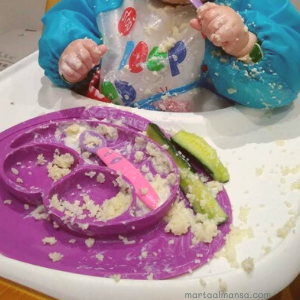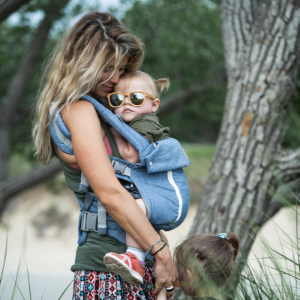We love bilingual education!
That’s why I’m very happy to interview here today the Director of “The Bilingual London Nanny”: Veatriki Poulou.
As a multilingual mum raising multilingual children myself, I know that parents benefit from as many resources as possible: from bilingual books, to songs, playgroups or playdates. And, of course, why not bilingual childcare as well? For those bilingual families looking for a nanny, bilingual nannies could be the perfect help and source of support they need.
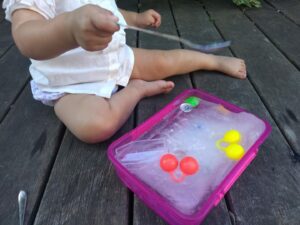
How do bilingual nannies support bilingual education?
Veatriki Poulou: “I will talk about my experience as a bilingual nanny – nannies can support bilingual education by playing, storytelling, interactive activities and lots of talking. Talking to a child a second language in everyday life makes a huge impact in their vocabulary and their later communication skills. I personally, as a nanny, use the OPOL method (One Parent, One Language) and talk to their children I look after in their minority language (Greek). I talk in Greek to them about everything and I use English only with our non-Greek friends and relatives and only if a word is very difficult and it needs an explanation.”
What are the benefits of bilingual nannies?
Veatriki Poulou: “A bilingual nanny is one of the best ways for a child to learn a language. A bilingual nanny can talk to the child naturally and this way the child will learn new words and phrases by a native speaker. Also, it’s about learning a second culture. New traditions, new food, new unique history, new beliefs, new expressions, new clothing, new music, etc. can help the child discover a whole new world and be open minded about other people’s cultures later in life.”

What types of activities do bilingual nannies do to encourage language development?
Veatriki Poulou: “What I personally do as a nanny and what I encourage my bilingual nannies to do in a new position is talking as much as you can to/with the child. This can start from a very young age, even newborn age, by talking to the baby about the surroundings, reading simple stories to them and singing.
Later they can do the same with a toddler but we can add more activities such as flash cards, games or going to the shops and name as many products as they can. Eg. The fruit and vegetable section at the supermarket is a great opportunity to learn how we can say their names in another language. Reading, storytelling, rhyme time and puppet show are my go-to activities to support bilingualism at all times.”
Could you recommend us two resources to support children’s bilingual education?
Veatriki Poulou: “There are lots of resources around the internet and plenty of books that we could find online for raising bilingual children. My favourite resources are the “Bilingual Kidspot” website and plenty of groups on Facebook such as the “We live Languages” page. Also, you can find lots of advice and ideas on “The Bilingual London Nanny” Facebook and Instagram.”
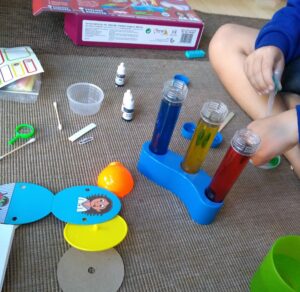
Do you think there are enough activities in London to support bilingual education?
Veatriki Poulou: “There are a few of activities around London to support bilingual children but I do believe that they are never enough. For example, there are usually bilingual playgroups during the weekend but nothing during the week and not in all London areas. I believe that they should be more activities for supporting bilingualism and bilingual education.”
Could you please tell us an anecdote of being a bilingual nanny?
Veatriki Poulou: “It’s always fascinating how the children who are native English or even half English always correct my strong Greek accent. I do my best but there will always be words that I will say with the wrong accent, according to a child, and then they have to correct me! One day I was taught by a 6 years old how to pronounce “tuna” in a proper British way! I mean, to me it was simple but according to her it was wrong and she had to teach me! I always enjoy these moments.”
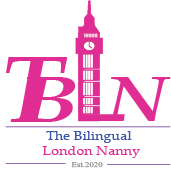
About The Bilingual London Nanny
How can parents get in touch with you to find the best nanny for their family?
VP: “The Bilingual London Nanny was a dream that came true last year just before the pandemic hit the UK. It’s been a weird difficult year for the company, as that was my first attempt ever, but I can’t complain as I had a few of the best clients I could have ever found. Also, the nannies that are registered with my agency are the best of the best! All the nannies are experienced in their countries and in the UK, ideally London, qualified, DBS Checked and hold a first aid certificate. I am based in NW London and we cover NW and SE London, where most of my clients are from.
What I offer are top notch nanny service, free consultation about the family’s needs, free interviews with the nannies that the familylikes, consultation and advice on most of the children’s related sectors, trials with potential nannies and placement service.
Parents can find me on the social media on Facebook or Instagram. Also, they can get in touch via email at tblnanny@gmail.com and on WhatsApp at 07450860714.”
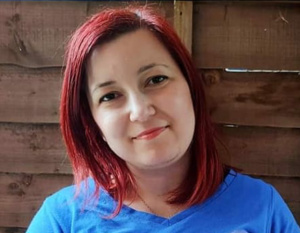
About Veatriki Poulou
Please tell us about you and your first-hand bilingual journey
VP: “I am Veatriki, a Greek professional and qualified nanny. I have studied childcare back in my hometown and I work with children since then. I have been in the childcare sector for the last 16 years.
I moved to London 8 years ago and since then I have worked as a bilingual nanny for Greek or half Greek families. My first position as a nanny in London was with a family that wanted me to talk to their little baby only in Greek so I started using the OPOL method. Later, I started doing research about bilingualism and I realised how interesting and important this is in a child’s life. Especially, the very first years of a child’s life are very critical.
Since then, I worked with lots of other families using the same method and later with English families as well as I felt quite confident with my English to start looking after non Greek children.
Meanwhile, I would never stopped doing something extra on the side of my main job supporting bilingualism and the Greek language. I have helped a mum, who used to run her own Greek playgroup, making crafts and doing puppet shows for the little ones there.
A few years later with a very good friend of mine, we started our very own playgroup, called “Tsaf Tsouf Playgroup” for Greek children in London. We used to do interactive storytelling, crafts, active game, puppet show, messy play, rhyme time and much more. Now, “Tsaf Tsouf Playgroup” has transformed into “Tsaf Tsouf on the Go!”. This means that it’s going to children’s places either as party entertaining or children’s play dates/one –to-one play. And it has expanded to non-Greek families too.
Last but not least, I started running my very own nanny agency, not only for Greek families and nannies but for all the bilingual nannies and families in London. “The Bilingual London Nanny” believes that every bi/multilingual family has the exact same struggles, no matter the language.
So, here I am today, willing to assist any family finding their perfect nanny fit! Because bilingualism matters!”

